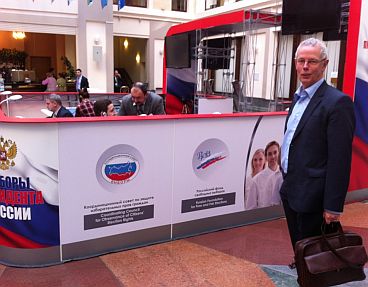Tiny Kox in Russia: First observe, only then draw conclusions
Tiny Kox in Russia: First observe, only then draw conclusions
On Sunday 4th March Russia elects a new president. International observers are in the country to look into the degree to which the elections are free and fair. SP Senator Tiny Kox is head of the Council of Europe observers’ team and will report each day.

SP Senator Tiny Kox in Russia last month as head of the Council of Europe election observers’ team
Day 1: First observe, only then draw conclusions
On the way to Moscow from the airport I notice that there aren’t many election-related hoardings, and that these are generally for either Prime Minister Putin or his billionaire opponent Prokhorov. The rest of the candidates – the Communist Zjuganov, the nationalist Zjirinovski and the centre-left Mironov – evidently don’t have enough money to hire many of these extremely expensive sites. I can ask them about this when I meet them tomorrow.
Whether this time I will get to speak with Putin remains to be seen. Yesterday I received a phone call from Moscow to the effect that he would probably now be interested in meeting our delegation. In February, when I was in Moscow to prepare the ground for our election observation, he was too busy with affairs of state. I replied that it would be nice if he was now available. We are here at the invitation of the Russia Parliament to observe the presidential elections and it would be good if we could speak to all the candidates. I said I understood the prime minister must have a full agenda but that I could only view him as one of the five candidates.
When I arrived at my hotel I hardly had time to unpack before a television team from Reuters was ready to interview me. I told them what I will tell all journalists in the coming few days: until the ballot boxes are sealed we are going to observe, and only then will we draw conclusions on which we will base our later advice.
First stop is the Dutch embassy, where I meet with the Ambassador, his deputy and the Dutch observers from the Organisation for Security and Cooperation in Europe, the OSCE, who will be working alongside the Council of Europe team. Alexander Munninkhof, who was refused entry by the Russian authorities during the parliamentary elections, is also there. This time there have been no problems, possibly a sign that things are changing in Russia.
I’m asked by the Ambassador to recount something of my experiences since the beginning of November when I began my work here with the observer team. My advice to the other observers was not to jump to conclusions. If you think you’ve understood Russia, you clearly haven’t. I explain why you have to pay close attention on election day, in the polling stations. And I speak about the things that didn’t go well in the parliamentary elections in December. I urge everyone to remember why we are here – to observe. As for voting, the Russians can do that for themselves. How they will vote, we shall see.
